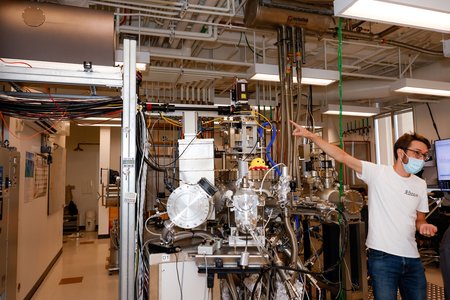Quantum Leap: Caltech’s IQIM Secures 6-Year Grant for Cutting-Edge Research
The National Science Foundation (NSF) has awarded Caltech’s hub for cutting-edge quantum research, the Institute for Quantum Information and Matter, or IQIM, $13.8 million to support six more years of operations. IQIM is one of several NSF Physics Frontiers Centers, which bring together a collection of research groups, often across disciplines, and are designed to “foster major breakthroughs at the intellectual frontiers of physics.”
IQIM, which first became a Physics Frontier Center in 2011, explores innovative topics in quantum science. The center’s researchers study physical systems “in which the weirdness of the quantum world becomes manifest on macroscopic scales,” according to the center’s website. IQIM’s work has applications in quantum computing, precision measurement, fundamental physics, and the creation of new quantum materials with potential societal benefits in the areas of health care, cybersecurity, energy production, and the sustainability of the planet.
“Quantum research centers are springing up all over the world in recent years, but NSF recognizes that IQIM has a unique and valuable role,” says John Preskill, the Allen V. C. Davis and Lenabelle Leadership Chair of IQIM and the Richard P. Feynman Professor of Theoretical Physics. “We’ve built a highly interconnected community focused on exploiting quantum technology for scientific discovery. We’re proud of our past accomplishments, but more importantly, this new award will enable IQIM to lead further advances in quantum science that lay the foundations for extraordinary future applications.”
“Research teams at NSF Physics Frontiers Centers have made breakthrough after breakthrough, such as creating remarkable new states of matter and revealing the first evidence for the gravitational wave background of the universe,” says NSF Director Sethuraman Panchanathan. “While different in their respective areas of focus, NSF’s newly funded centers are all bold team efforts to punch through to exciting new vistas of scientific exploration. Achieving transformative opportunities requires us to reach those vistas through new technologies and other advances and have a look around.”
In the coming years, IQIM will continue to probe the quantum realm with the goal of igniting ever-deepening insights into information, matter, and the universe. The center’s researchers will study promising hardware platforms for quantum computers, including those based on individually controlled atoms as well as superconducting materials, the latter of which are being actively investigated by the AWS Center for Quantum Computing on the Caltech campus. IQIM researchers will also study exotic types of matter such as topological materials, which may be useful for reducing the errors that are common in quantum computing.
Another focus of IQIM will be on quantum precision measurements, or quantum metrology. By harnessing the phenomenon of quantum entanglement, in which particles such as photons are connected and become more cooperative with each other, researchers have been able to make more-precise measurements at smaller and smaller scales. This work may lead to more-accurate optical clocks and more-precise detection of very weak forces, with applications in next-generation gravitational-wave detection. Caltech’s new Dr. Allen and Charlotte Ginsburg Center for Quantum Precision Measurement will address many of these topics in tandem with IQIM.
A major success of IQIM has been the development of an extensive outreach program that includes the Quantum Frontiers blog; short films that star celebrities such as Paul Rudd, Zoe Saldana, and Keanu Reeves; science advising for movies such as Ant-Man; the development of quantum games such as quantum chess; and several in-depth programs for K-12 students.
“I want kids to have the same intuition for quantum physics that they have about gravity,” says Spiros Michalakis, a mathematical physicist and the IQIM outreach manager. “When they throw a ball, they intuitively understand gravity, but they haven’t had the same exposure to quantum physics. None of us have. I think it’s imperative to meet kids where they are at, with games and stories deeply infused with quantum science.”
The center’s roots go back to the late 1990s, when Preskill and H. J. “Jeff” Kimble, now Caltech’s William L. Valentine Professor of Physics, Emeritus, received a grant from the Defense Advanced Research Projects Agency (DARPA) to study quantum computing’s potential applications in cryptography. Later, in 2000, Preskill and Kimble were awarded funding from the NSF for their growing group, which, at that time, was called the Institute for Quantum Information, or IQI.
“I wanted to bring in the best young scientists and give them a lot of freedom, to create a community of people who had some common interests, but also complementary backgrounds,” said Preskill of the early days of the center in an interview with the Caltech Heritage Project. “So, I deliberately would put a computer scientist in the same office with a physicist so [they] would talk.…We had an amazing group of young people in the early 2000s who came through, many of whom are leaders of research in quantum information now.”
IQI focused solely on theoretical studies until 2011, when the NSF expanded the center’s funding and scope to include experimental work. That’s when IQI became the Institute for Quantum Information and Matter.
“All of a sudden, we attach M—matter—and it really mattered because it wasn’t just that experimentalists started knocking on our door, we started to have conversations [about] how you can convert some of the theories into experiments that then could advance quantum computing or quantum metrology or quantum anything in the future,” Michalakis said in his own interview with the Caltech Heritage project. “[IQIM] became a very strong nucleating force for so many different individuals.”
Preskill adds, “In each award cycle we’ve refreshed IQIM by bringing in new ideas and new people who are eager to launch new collaborations. And we encourage people to try risky things. Some of our projects might fail, but you need to take a risk to make a breakthrough.”

